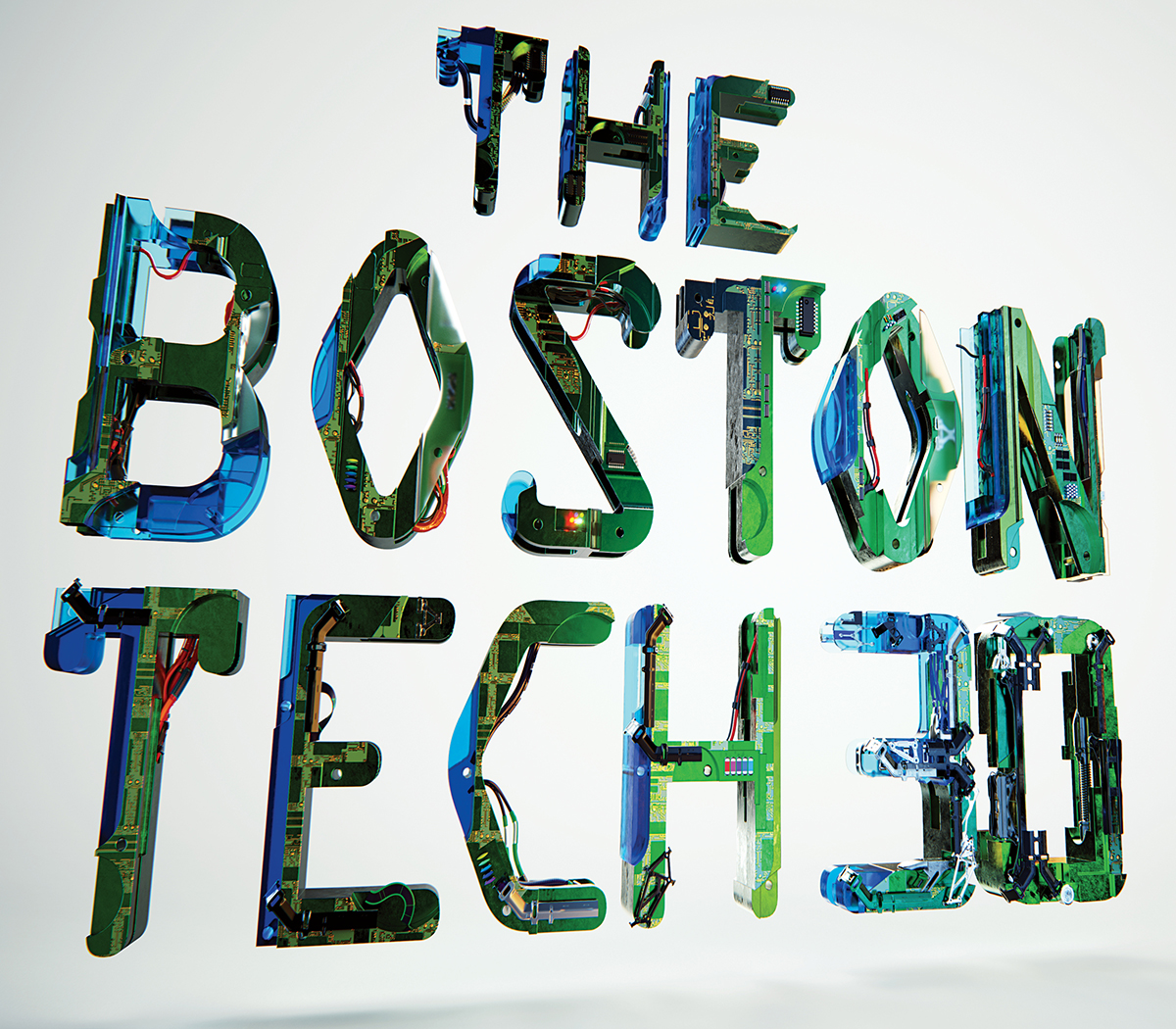The Boston Tech 30

Illustration by Peter Crowther
Boston and innovation have a long, beautiful history together. Our town was the birthplace of email, Facebook, and the computerized spreadsheet, of public schools and American higher education. (And while we’re at it, let’s not forget the microwave oven, the burglar alarm, and the disposable razor.)
So what’s the state of innovation in Boston right now? More important, who are the people leading innovation when it comes to technology and entrepreneurship? On the following pages we present the first-ever Boston Tech 30. It’s a wide-ranging list, from the CEOs of star companies like HubSpot and Wayfair, to heavy-hitting VC types funding the next wave of innovation, to dynamic young entrepreneurs who just might be building Boston’s new breakout corporations.
GE’s move to town this summer—not to mention the explosion of tech startups in places such as Kendall Square, Downtown Crossing, and the Seaport—signal not only a healthy present for Boston tech, but also a vital future. Want to be part of the scene? These are the people you need to meet to turn your big idea into a reality. Just want to know who’s leading the most dynamic sector of Boston’s economy right now? These are 30 names you need to remember.

Pamela Aldsworth
There’s a definite pecking order in high-tech circles, with entrepreneurs, technical talent, and venture capitalists near the top. Farther down are the “service providers”—lawyers, bankers, real estate agents, and the like. Aldsworth, managing director of Silicon Valley Bank, is technically a member of the service provider class, but she’s been so active in the Boston startup community that it’s almost like no one notices. And besides, she says, “I don’t really like banking.” Instead, her bank’s platform affords Aldsworth the chance to do what she really enjoys, which is to work directly with entrepreneurs—including TJ Parker, of the next-gen online pharmacy PillPack, and Dulcie Madden, of the “smart nursery” startup Rest Devices—on their day-to-day. Aldsworth also cofounded a women’s CEO group with Katie Rae, of Project 11 Ventures.

Dave Balter
Balter’s word-of-mouth marketing startup, BzzAgent, and his skills-testing site, Smarterer, encountered plenty of naysayers along the way. Both companies dumbfounded fans of the status quo—and yet each would go on to be acquired for a handsome sum. In the process, Balter became a go-to angel investor, backing about 50 startups so far, and he’s become equally well known for throwing startup-community parties that are the stuff of legend. “Events help accelerate the pace of innovation,” Balter says. “Plus, who doesn’t like to attend an all-out open-bar rager for 800 of your closest friends?”

Rodney Brooks
Behind the artificially intelligent robot that’s vacuuming your floor right now, there’s human intelligence—specifically, that of Brooks. A longtime MIT professor—now emeritus—Brooks invented the Roomba and cofounded the company that sells it, Bedford-based iRobot. A little farther down his résumé is his work on the Sojourner rover, which was sent to Mars (maybe you saw its cameo in the film The Martian last year). Today, Brooks is focused on his company Rethink Robotics and its humanlike robot Baxter, which is smart enough to labor side by side with factory workers. For all of his brains, there’s something Brooks doesn’t get: people who think that sci-fi nightmares of an AI uprising could actually come true. “All of this stuff about super-intelligent robots, it ain’t happening,” he says. “I’ve been making these [intelligent robots] real—making them more real than anyone else—and it’s hard work.”
More: Our 2014 Profile of Rodney Brooks, “Machine Man”

Jeff Bussgang
When Bussgang published a book aiming to demystify the interplay between entrepreneur and venture capitalist, it had some serious cred built in, given that Bussgang cofounded the loyalty-marketing startup Upromise before joining Flybridge Capital Partners, which has backed high-flying companies including MongoDB and DataXu. Tying the two worlds together, Bussgang’s 2011 book, Mastering the VC Game, has served to raise his profile well beyond Boston (so has his post as a senior lecturer at Harvard Business School). Bussgang is now at work on a second book that, like his first, will be more focused on making an impact than on reaching the bestseller lists. “One of my favorite comic-book heroes as a kid was Spider-Man, who always liked to say, ‘With great power comes great responsibility,’” Bussgang says. “I don’t think I have a lot of power per se, but I do feel tremendous responsibility to Greater Boston as a whole and the tech community in particular.”
More: Jeff Bussgang and Jennifer Lum Discuss Boston’s Tech Scene

Dries Buytaert
In the world of open-source software, Buytaert stands as a giant for being the original creator of Drupal. The free system for managing Web content has evolved into one of the most popular ways to run a website since its beginnings in 2000 (it now powers one out of every 40 sites, according to Buytaert). That’s partly thanks to his Boston company, Acquia, which helps businesses get onto Drupal. Acquia has been one of the fastest-growing tech firms in Boston since its launch in 2007, and its client list includes the likes of Pinterest and the BBC. “Building a new kind of company like Acquia is the harder, less-traveled path,” Buytaert says. “But we always believed it would be the best path.”

David Cancel
Cancel fits the description of a “serial entrepreneur” as well as anyone in Boston. Between 2000 and 2011 he founded and sold four startups, a breakneck pace even for the tech world. “I love the grind,” says Cancel, whose Twitter following of 119,000 suggests many people love what he has to say about the grind, too. Cancel is a “role model to many young leaders in Boston,” says Kayak cofounder Paul English. Cancel’s cachet also stems from his time at HubSpot, which bought his startup Performable in 2011 and which he helped make into a top player in the hot marketing technology sector. “It’s all about the process and putting in the work,” Cancel says. Which, by the way, he’s now going through with his fifth startup, Drift.

Wayne Chang
For some entrepreneurs, their story stops getting interesting at the point that they sell their startup. For Chang, the startup sale was just a prelude. Cofounder of the app-crash reporting tool Crashlytics, Chang sold it to Twitter in 2013 for more than $100 million—roughly 17 times what the company had raised in funding. And he’s stuck by Twitter, which opened a Cambridge office following the acquisition, ever since. The Crashlytics team and technology have provided the basis for many of Twitter’s mobile efforts, including the development platform Fabric. “The traction, distribution, and execution has been phenomenal,” Chang says. “And that’s largely attributed to the amazing talent that exists only in Boston.” Meanwhile, Chang also ranks among the most prominent young investors in local startups, with more than 45 investments to date. His mantra: “I believe in paying it forward.”

Clayton Christensen
Though he’s one of the most-mentioned names throughout the tech industry, Christensen has never launched a billion-dollar startup himself. He’s done plenty of innovating by proxy, however. The Harvard Business School professor is most famous for authoring The Innovator’s Dilemma, a book that promulgated his theory of “disruptive innovation” and inspired untold numbers of startups to do what they do—i.e., take on bigger, slower-moving companies. Or “disrupt” them, as we now say thanks to Christensen. Yet even with the wide circulation of his ideas, Christensen sees signs that many companies are still lousy at embracing technological change. “And it distresses me,” he says. “We have a tendency to believe that bad things will happen to everybody else, but not to us. But the theory of disruption predicts that disruption will occur in almost every industry.” Christensen’s latest book, Competing Against Luck: The Story of Innovation and Customer Choice, will be out this month.

Maria Cirino
Cirino has had a front-row seat to the transformation of cybersecurity into one of the hottest areas of high tech. After launching and successfully leading a security startup, Guardent, through its acquisition in 2003, Cirino cofounded .406 Ventures in 2006: The aim was to invest in areas, like cybersecurity, that were considered unsexy at the time. Fast-forward a decade, and headlines about data breaches suggest that was a prescient course to choose. “I’m proud that we built the kind of firm we envisioned from day one,” Cirino says. Among the Boston cybersecurity companies that .406 has backed are Carbon Black and Veracode, both candidates for going public in the near future.

Paul English
If imitation is a form of flattery, then English can consider himself abundantly flattered. There’s a long list of direct clones for Kayak, the travel search site he cofounded in 2004 and copiloted as CTO for a decade. Then there’s another lengthy list of “Kayak-for-X” startups, which borrow Kayak’s approach of offering side-by-side price comparisons. After convincing much of the world to book flights and hotels online, though, he’s now doing a bit of an about-face. That’s because with his new travel concierge app, Lola, he’s looking to bring human travel agents back into the mix. Let the countdown to the Lola copycats begin.


